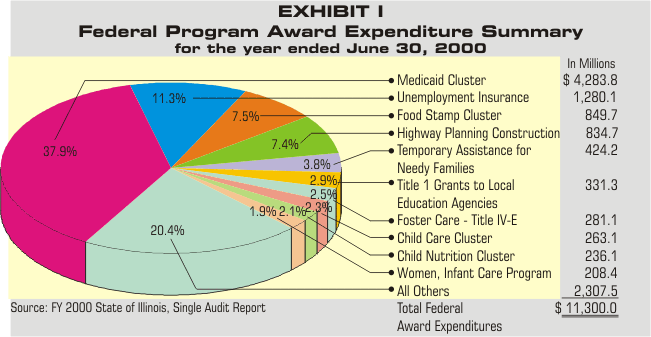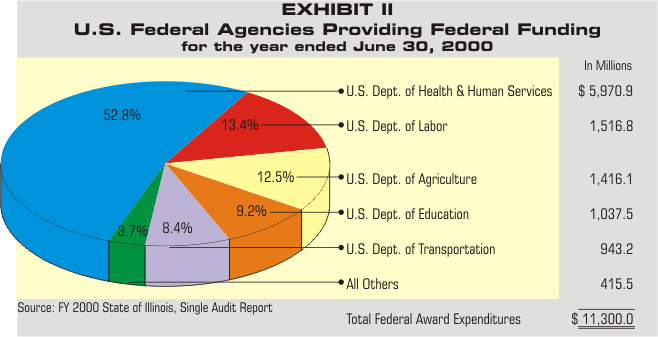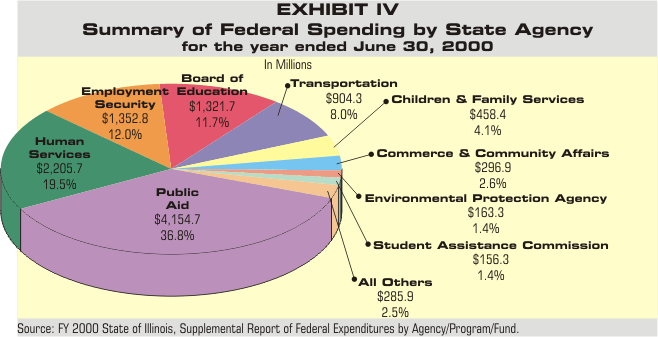CLAIMS AND ADJUSTMENTS FOR FEDERAL REIMBURSEMENT NOT
PROPERLY ACCOUNTED FOR
The auditors were unable to obtain sufficient
documentation from the Department of Children and Family Services (DCFS) supporting
compliance regarding allowability and period of availability for the Adoption Assistance
and Foster Care programs. This condition resulted in an audit scope limitation. Total FY
00 federal program expenditures from the Adoption Assistance and Foster Care programs were
$65,636,000 and $281,080,000, respectively. Questioned costs could not be determined.
The grant accounting system maintained by DCFS was not
able to adequately match the expenditure to the period in which federal claims were being
made. Similarly, adjustments were often recorded to reduce amounts previously claimed for
beneficiaries who were later determined to be ineligible. As a result, DCFS could not
provide a list of expenditures (adjustments) that related to claims filed in FY 00 but
incurred in FY 99 (and prior).
The "period of availability of federal funds" is
limited to within 2 years after the calendar quarter in which the State made the
expenditures. (Finding 00-15, pages 57-58)
We recommended DCFS either: (1) develop a program which
will identify the adjustments recorded in a quarter by comparing detail with the previous
quarter; or (2) revise its grant accounting system to record the date in which an
expenditure is claimed for federal reimbursement.
DCFS officials agreed with the finding, and stated they
are making enhancements to their automated financial systems along with changes to their
retention practices for quarterly claiming documentation files.
INSUFFICIENT FEDERAL FUNDING INFORMATION AND INADEQUATE
AND UNTIMELY MONITORING OF SUBRECIPIENTS IN THE FOSTER CARE PROGRAM
The Department of Children and Family Services (DCFS)
does not adequately monitor or have an adequate system in place to report federal funding
to Foster Care subrecipients.
DCFS only communicates federal award information to
subrecipients upon request by a subrecipient. OMB Circular A-133 requires that each
subrecipient of a federal program be notified of the federal program's Catalog of Federal
Domestic Assistance title and number, award amount, award name and number, and award year.
Also, in 25 subrecipients sampled out of a total of 113
subrecipients (totaling $108,757,000 of $281,080,000 in federal expenditures,
respectively), we noted certain items of noncompliance. Some of the conditions noted in
our sample results showed DCFS did not always: (1) receive subrecipient audit reports
timely; (2) perform timely desk reviews and take appropriate action when necessary; and
(3) reconcile A-133 reports to financial information in subrecipient files. Further, we
noted DCFS is on a two-year lag in performing on-site monitoring activities and reviewing
the allowability of the costs and activities of subrecipients. (Findings 00-17 and 00-18,
pages 61-64)
As a result of the conditions noted for the compliance
requirement pertaining to subrecipient monitoring, the auditors qualified their report on
major programs for the Foster Care Program.
We recommended DCFS implement procedures to ensure: (1)
OMB Circular A-133 reports are received within the 180 days as required; (2) desk reviews
are performed timely, including review of reports, follow-up on subrecipient findings and
implementation of corrective action plans, receipt and review of applicable management
letters, and documentation of such review; (3) the reconciliation of the OMB Circular
A-133 reports to financial information in subrecipient files; (4) an evaluation of the
current staffing of the monitoring department to ensure resources are adequate; and (5)
required federal funding information to the subrecipient is provided on a timely basis.
DCFS officials agreed with all the findings and
recommendations with the exception of one. That exception relates to the feasibility of
completing the oversight cycle timely (within a one-year time period) instead of the
current two-year cycle.
FAILURE TO ADEQUATELY ESTABLISH AND MONITOR STATE
DISBURSEMENT UNIT
The Department of Public Aid (DPA) did not adequately
establish and monitor the State Disbursement Unit (SDU) for child support payments. This
condition resulted in an auditor qualification on the Child Support Enforcement Program
for the compliance requirement pertaining to special tests and provisions.
The SDU creation was mandated by the Federal Personal
Responsibility and Work Opportunity Act of 1996. During our audit and discussions with
management, several operational problems were noted from the SDU's inception. Problems
identified included backlogs of checks received from employers for distribution to
custodial parents due to the inability to match checks to child support orders and checks
being sent to the wrong address. (Finding 00-01, pages 28-30)
We recommended DPA closely monitor the transition process
to a new vendor and establish formal procedures to review the SDU activities on a
recurring basis. Also, we recommended that DPA require an annual audit of the SDU. This
audit, at a minimum, should include a report on the significant controls placed in
operation and tests of the SDU's operating effectiveness.
DPA officials stated that the current framework is now
working well with minimal disruptions and the agency will attempt to improve and stabilize
the existing system. Upon stabilization, DPA anticipates a smooth and trouble free
transition to a new vendor can occur. DPA agreed with the implementation of formal
procedures to review SDU activities, yearly audits of the SDU's transactions, and
significant controls and tests to measure operating efficiency.
INACCURATE DATA IN KEY INFORMATION DELIVERY SYSTEM
The Department of Public Aid (DPA) is not maintaining
accurate data in the Key Information Delivery System (KIDS) which has resulted in numerous
errors in child support accounts receivable balances. A review of the KIDS was performed
in FY 00 by IDPA to determine the extent to which prior years' problems had either been
resolved or still existed and what corrective actions were needed. IDPA staff concluded
that from a sample of 81 child support cases: (1) errors similar to those in the past two
audits, FY 98 and FY 99 still existed; (2) all 81 cases contained one or more errors; (3)
20 of the 81 (25%) cases contained errors related to accounts receivable balances; and (4)
corrective action will require system changes to KIDS, retraining of supervisors and field
staff, along with closer supervision of field staff. (Finding 00-02, pages 31-32)
This condition resulted in an auditor qualification on the
Child Support Enforcement Program for the compliance requirement pertaining to special
tests and provisions. In FY 00 total federal program expenditures for Child Support
Enforcement were $99,722,000.
We recommended DPA continue its efforts in identifying and
correcting all data integrity problems in KIDS and other noted deficiencies.
DPA officials stated they are continuing their efforts to
identify and correct all data integrity problems and other noted deficiencies.
NON-ENFORCEMENT OF SANCTIONS OVER TANF RECIPIENTS
The Department of Public (DPA) is responsible for
administering the Child Support Enforcement Program. The objectives of this program are to
enforce support obligations owed by non-custodial parents, to locate absent parents,
establish paternity, and obtain child and spousal support. In situations where a parent is
non-cooperative in establishing paternity and is also receiving Temporary Assistance for
Needy Families (TANF) benefits, DPA is required to refer the case to the Department of
Human Services (DHS) for sanctions (reduction or elimination) of the TANF benefits.
We sampled 25 cases that should have been referred to DHS
from DPA due to a notice of non-cooperation to the parent in establishing paternity. We
reviewed the case files to ensure that the case was referred to DHS and DHS took the
proper course of action to either sanction or solicit cooperation from the TANF recipient
with respect to paternity establishment. Of the 25 cases reviewed, we found that DPA did
not refer six cases to DHS which resulted in DHS not being able to take the proper action
to either reduce or deny TANF benefits.
Per Federal Code, when the State finds an individual is
not cooperating with the State in establishing paternity, etc., the State TANF agency
(DHS) must (1) deduct an amount equal to not less than 25% from the TANF assistance, and
(2) may deny the family any TANF assistance. (Finding 00-08, pages 43-44)
This condition resulted in an auditor qualification on the
TANF program for the compliance requirement pertaining to special tests and provisions. In
FY 00 total federal program expenditures for TANF were $424,169,000. Questioned costs
cannot be determined.
We recommend DPA implement control procedures to ensure
that all TANF recipients who are non-cooperative in establishing paternity are referred to
DHS for proper sanctions.
DPA officials agreed with the finding and indicate they
now notify DHS via an electronic transaction the same night the DPA staff enter a
disposition of non-cooperation.
INADEQUATE ON-SITE MONITORING OF SUBRECIPIENTS
RECEIVING FEDERAL AWARDS
The Illinois State Board of Education (ISBE) is not
adequately performing on-site reviews of subrecipients receiving federal awards.
The ISBE policy is to perform on-site reviews and
inspections of subrecipients every 4 to 6 years. ISBE documents subrecipient monitoring
activities and stores the documents in each individual subrecipient file. During testwork,
2 of 50 subrecipient files selected could not be located. Due to these files not being
located and available, there is no evidence the requirements contained in the Compliance
Supplement were being performed. Secondly, we noted no on-site reviews were done within
the last six years on 10 of 25 subrecipients tested. (Finding 00-21, pages 68-69)
This condition resulted in an auditor qualification on the
Special Education Cluster programs for the compliance requirement pertaining to
subrecipient monitoring.
We recommended ISBE review its subrecipient files on a
regular basis to ensure all supporting documentation is properly included in the file. We
also recommended that ISBE consider revising its on-site monitoring policy for federal
programs to use a risk-based approach for selecting subrecipients for on-site visits.
ISBE officials agreed with our finding and stated they
have been considering a risk-based assessment process. Also, other monitoring processes
will likely continue to be performed by various units within the agency.
INACCURATE CASH TRANSACTIONS AND FEDERAL STATUS REPORTS
FILED
The Environmental Protection Agency (EPA) did not
properly report expenditures in the quarterly Federal Cash Transaction Report and the
annual Financial Status Reports for the Capitalization Grants for State Revolving Funds
and the Capitalization Grants for Drinking Water State Revolving Funds programs. The
amounts reported were not in agreement with supporting schedules or system data used to
generate the reports. (Finding 00-30, pages 87-89)
This condition resulted in an auditor qualification on
capitalization grant programs for the compliance requirement pertaining to reporting.
We recommended EPA prepare the reports using the cash
basis expenditure balance at the end of the period. We also recommended the employee
preparing the reports print out the applicable supporting schedules used in report
preparation and copy the relevant pages of the cash management, payroll and other systems
that support the amounts on the supporting schedules. Lastly, we recommended an
independent review of the report and supporting schedules by a knowledgeable individual be
completed prior to report(s) submission.
EPA officials accepted our recommendations and responded
they have implemented procedures to ensure that expenditures for both programs will be
accurately reported on the quarterly and annual reports. In addition, the EPA has filed
amended reports for the period July, 1999 to June, 2000.
OTHER FINDINGS
The remaining findings pertain to other compliance and
internal control matters. We will follow up on the status of corrective action on all
findings in our next Statewide Single Audit for the year ended June 30, 2001.
AUDITORS' OPINION
The auditors have stated the Schedule of
Expenditures of Federal Awards for the State of Illinois as of and for the year ended June
30, 2000 is presented fairly in all material respects.
____________________________________
WILLIAM G. HOLLAND, Auditor General
WGH:SES:pp
SPECIAL ASSISTANT AUDITORS
KPMG LLP were our special assistant auditors for
this audit.


